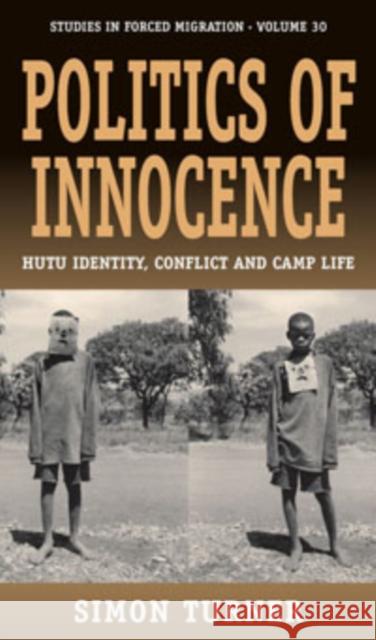Politics of Innocence: Hutu Identity, Conflict and Camp Life » książka
Politics of Innocence: Hutu Identity, Conflict and Camp Life
ISBN-13: 9781845456917 / Angielski / Twarda / 2010 / 194 str.
Politics of Innocence: Hutu Identity, Conflict and Camp Life
ISBN-13: 9781845456917 / Angielski / Twarda / 2010 / 194 str.
(netto: 485,11 VAT: 5%)
Najniższa cena z 30 dni: 498,70
ok. 30 dni roboczych.
Darmowa dostawa!
"Turner's book offers fascinating insights into the daily realities in a refugee camp hidden under the bureaucratic model imposed by the relief agencies. In the UNHCR staff's blueprint the camp is an a-political, homogeneous space and refugees are innocent victims who have to be empowered. Turner shows - with the help of both vivid ethnography and seminal interpretations - that reality is strikingly different." - Pieter Geschiere, University of Amsterdam "This work represents a major contribution to the understanding of camp life in refugee contexts. Given the limited number of texts in English on the Burundi conflict and refugee contexts, this work will be of considerable significance. It is the first to engage with the recent post-1994 refugee population on the ground and based on original material that is derived from primary research in a refugee camp." - Patricia Daley, Oxford University Based on thorough ethnographic fieldwork in a refugee camp in Tanzania this book provides a rich account of the benevolent "disciplining mechanisms" of humanitarian agencies, led by the UNHCR, and of the situated, dynamic, indeterminate, and fluid nature of identity (re)construction in the camp. While the refugees are expected to behave as innocent, helpless victims, the question of victimhood among Burundian Hutu is increasingly challenged, following the 1993 massacres in Burundi and the Rwandan genocide. The book explores how different groups within the camp apply different strategies to cope with these issues and how the question of innocence and victimhood is itself imbued with ambiguity, as young men struggle to recuperate their masculinity and their political subjectivity. Simon Turner is Head of the research unit on Migration, Development and Conflict at the Danish Institute for International Studies. He has worked on the conflict in Burundi, doing ethnographic fieldwork among refugees and the Diaspora in East Africa and Europe. He has published on masculinity, Diaspora and conflict, sovereignty and public authority, and refugee relief work.
"Turners book offers fascinating insights into the daily realities in a refugee camp hidden under the bureaucratic model imposed by the relief agencies. In the UNHCR staffs blueprint the camp is an a-political, homogeneous space and refugees are innocent victims who have to be empowered. Turner shows - with the help of both vivid ethnography and seminal interpretations - that reality is strikingly different." · Pieter Geschiere, University of Amsterdam"This work represents a major contribution to the understanding of camp life in refugee contexts. Given the limited number of texts in English on the Burundi conflict and refugee contexts, this work will be of considerable significance. It is the first to engage with the recent post-1994 refugee population on the ground and based on original material that is derived from primary research in a refugee camp." · Patricia Daley, Oxford UniversityBased on thorough ethnographic fieldwork in a refugee camp in Tanzania this book provides a rich account of the benevolent "disciplining mechanisms" of humanitarian agencies, led by the UNHCR, and of the situated, dynamic, indeterminate, and fluid nature of identity (re)construction in the camp. While the refugees are expected to behave as innocent, helpless victims, the question of victimhood among Burundian Hutu is increasingly challenged, following the 1993 massacres in Burundi and the Rwandan genocide. The book explores how different groups within the camp apply different strategies to cope with these issues and how the question of innocence and victimhood is itself imbued with ambiguity, as young men struggle to recuperate their masculinity and their political subjectivity.Simon Turner is Head of the research unit on Migration, Development and Conflict at the Danish Institute for International Studies. He has worked on the conflict in Burundi, doing ethnographic fieldwork among refugees and the Diaspora in East Africa and Europe. He has published on masculinity, Diaspora and conflict, sovereignty and public authority, and refugee relief work.











